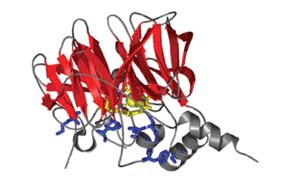Are you a journalist? Please sign up here for our press releases
Subscribe to our monthly newsletter:
There are gambles, and there are gambles. In a lottery, a modest investment buys a tiny chance of winning a fortune, while in Russian roulette, you run a fairly high risk of losing big-time. Evolution is a high-stakes game that combines features of both. Its instrument, mutation, carries a serious threat: mutations are hundreds of times more likely to be harmful than advantageous. But the right mutation at the right time can grant an all-important winning edge against competition or predators.
Recently a team of scientists, headed by Dr. Dan Tawfik in the Biological Chemistry Department, demonstrated how evolving organisms may be hedging their bets in the evolutionary game. In a paper published in Nature Genetics the scientists focused on a group of proteins that exhibit so-called “promiscuous” or “moonlighting” activity. Though evolved to perform a given function, these proteins are able to take on other, often completely unrelated, tasks as well. For example, the enzyme PON1 both removes cholesterol from artery walls and breaks up chemicals used in pesticides. Yet its main function is the removal of a completely different class of compounds. Tawfik believed promiscuity might provide nature with ready-made starting points for the evolution of new functions.
To investigate what advantage promiscuity offers, the team, which included Amir Aharoni, Leonid Gaidukov, Olga Khersonsky, Stephen McQ. Gould and Cintia Roodveldt, created a speeded-up version of evolution in the lab. They introduced random mutations into genes coding for a number of promiscuous proteins and selected those mutants with higher levels of activity in one specific promiscuous trait. After several rounds of mutation and selection, the scientists checked their enzymes to see what had changed. As expected, they had managed to increase the targeted activity a hundredfold or more. But did increasing one skill affect the others?

Indeed, though the selection process was aimed at one promiscuous trait alone, any other “moonlighting” activities carried out by the protein also underwent drastic adjustment – some dropping to as low as a thousandth of their former activity, though a few showed a significant increase. However, the primary function for which the enzymes had originally evolved changed by a factor of only one or two at most. “This is particularly surprising when you consider that all of these activities take place at the exact same site on the enzyme,” says Tawfik.
“In evolution, two contradictory things are necessary for the survival of organisms,” he says. “First, an organism needs to be robust – that is to undergo as little change as possible in functioning in spite of mutations. But evolutionary adaptation requires some mutations to induce new traits. It appears that the organism can have it both ways: the main function remains robust while the promiscuous functions are extremely responsive to mutation.”
Promiscuity may be an intermediate phase for some evolving proteins, the “moonlighting” functions becoming full-time “professions.” The protein line would then eventually split, diverging into two distinct genes.
Multi-tasking may also partly explain another phenomenon that has been puzzling biologists: Proteins both in the body and in bacteria rapidly become resistant to many drugs; and some enzymes, such as PON1, adapt to breaking down man-made chemicals that have been around for only 50-100 years. But promiscuous functions, because they’re secondary, haven’t been under the selection pressure that drives “traditional” evolution. Such skills may be in the wings, ready to provide the evolutionary shortcut needed for rapid adaptation.
Dr. Dan Tawfik’s research is supported by the Y. Leon Benoziyo Institute for Molecular Medicine; the Dolfi and Lola Ebner Center for Biomedical Research; the Estelle Funk Foundation; the Dr. Ernst Nathan Fund for Biomedical Research; the Henry S. and Anne Reich Family Foundation; the Harry and Jeanette Weinberg Fund for Molecular Genetics of Cancer; and the Eugene and Delores Zemsky Charitable Foundation Inc. Dr. Tawfik is the incumbent of the Elaine Blond Career Development Chair.